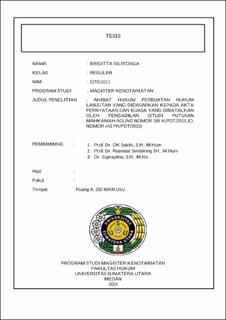| dc.description.abstract | A statement deed and power of attorney deed executed before a notary must be grounded in the principle of fairness. This principle emphasizes that every governmental or administrative action should consider societal values, including religious, moral, customary, and other applicable norms. The goal is to prevent deed execution from conflicting with these societal values. Another issue concerns the child's rights over shared property. This study addresses the following legal problems: (1) why the Statement and Power of Attorney Deed No. 33 dated July 27, 1998, and its derivatives were annulled by the court, (2) the notary's civil liability concerning the annulled statement and power of attorney deed, and (3) the legal consequences of subsequent legal actions based on the annulled deed, as decided in Supreme Court Decision No. 188 K/Pat/2013 Jo. No. 443 PK/Pd/2015
The research method employed is normative juridical, focusing on legal provisions established in written regulations, such as laws.
The annulment of the Statement and Power of Attorney Deed No. 33 dated July 27, 1998, and its derivatives was due to evidence proving that the deeds exceeded the rights and interests of Defendant I. Additionally, the Plaintiff argued that Defendant II also had a vested interest, acting in bad faith. The notary's civil liability concerning the annulled statement and power of attorney deed includes administrative, civil, and criminal responsibility. The legal consequences of subsequent legal actions based on the annulled deed are that the Statement and Power of Attorney Deed lose binding legal force due to their annulment. With the Power of Attorney Deed declared void, no further deeds or derivatives can be issued based on it. Subsequent legal actions, such as issuing a deed of sale, are thus null and void by law. | en_US |


